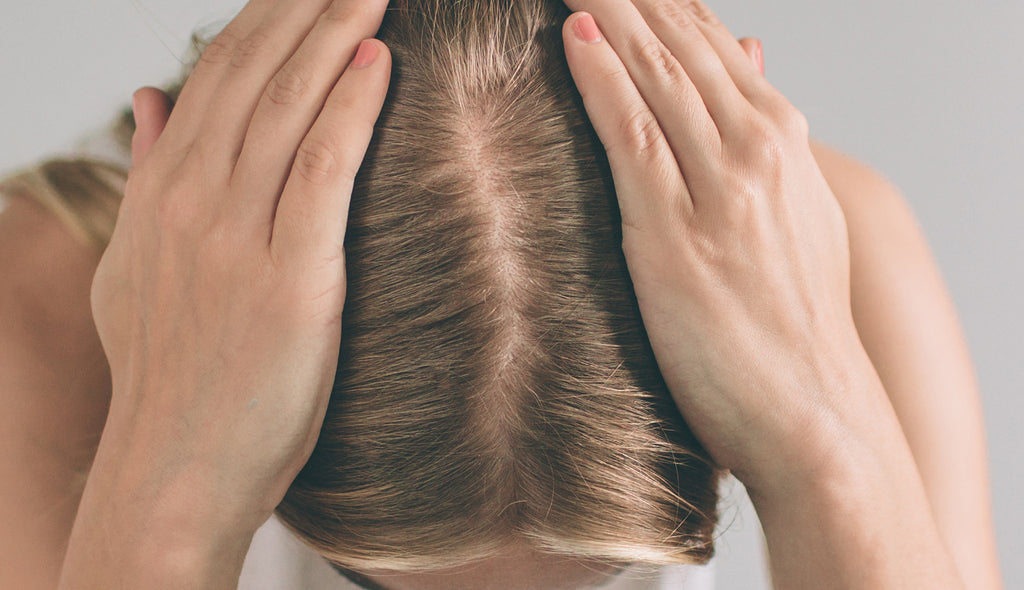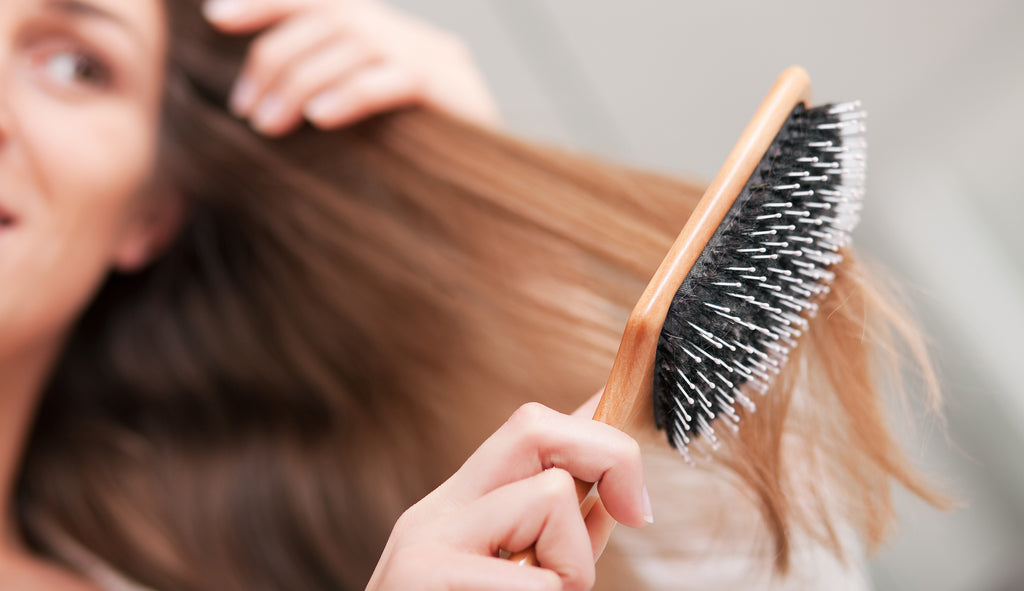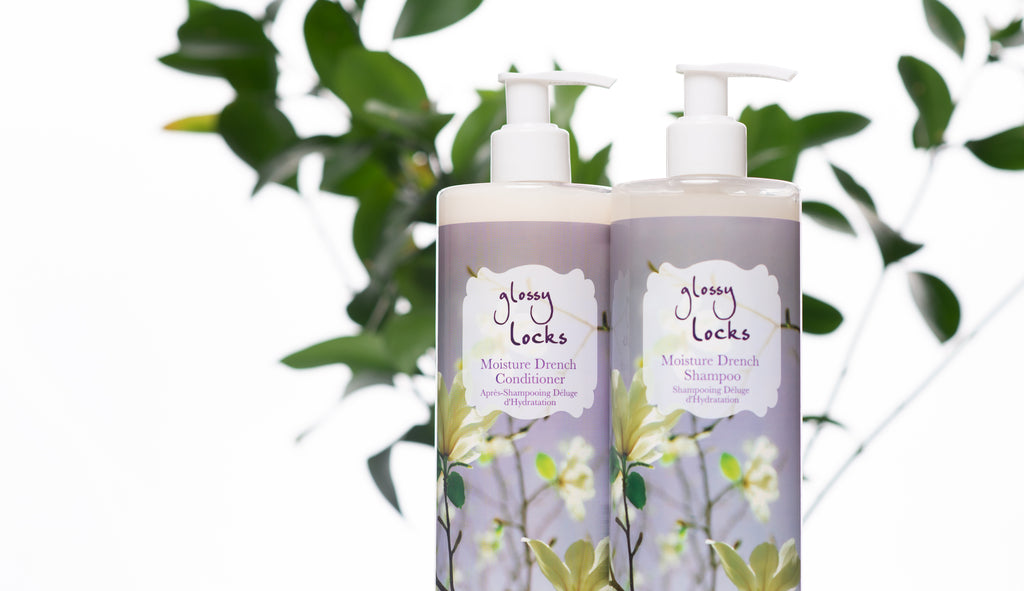Breaking down the do’s, don’ts, and how-tos of scalp exfoliation – plus how rosemary oil can promote hair growth
Written by: 100% PURE®
It’s time to talk about scalps: how we treat them, if they’re healthy, and how to add a step for them into our routine. A healthy scalp means by extension, healthy hair. We always hear the term, “from head to toe,” but we must admit - we don’t always think about scalp health.
Hair health starts at the scalp, so take a quick 5-10 seconds for a mental check-in with your scalp! How does it feel? Is it slightly itchy, or a bit dry? If you can feel hairspray residue from the past few days caking up and flaking off, it might be time to up your scalp care game.
To improve scalp health, you can piggyback onto your 3-minute shampoo and conditioner routine with a little scalp TLC. In this post, we’ll cover the pros and cons of scalp exfoliation, and share pro tips on if you should exfoliate your scalp. Then we’ll decide what you should use to exfoliate based on your hair type – plus the perks of rosemary oil for hair growth!
Exfoliation is the process of sloughing off dead skin cells, revealing healthier skin beneath. All skin can and should be exfoliated (except maybe eyelids? We’ll get back to you on that one). Without exfoliation, our skin can become dull and dry, or flaky and rough.
On our scalp, dead skin can clog hair follicles and damage hair length, fullness, and growth. When we exfoliate our scalp, we remove any product buildup that wasn’t cleaned off in our normal hair-washing session. The scrubby feeling of exfoliating also helps to stimulate blood flow, which can bring oxygen and protein to the scalp for healthier, longer hair.
Additionally, when we exfoliate we remove excess dirt and oil that could be causing hair loss and thinning hair. Oil and dirt buildup can clog our hair follicles and prevent hair from growing, or it can cause our hair to thin as the follicles slowly collect buildup. Exfoliating regularly helps to keep our scalps healthier and results in shinier, stronger, and longer hair.

There have been studies that have shown that scalp exfoliation should be a regular part of your hair care routine, and something we should be doing at least once a month or more. Depending on your hair type and hair length, you may want to exfoliate as infrequently as once a month, or as often as once to twice a week.
The thicker, curlier, and longer your hair is, the more often you should exfoliate. On the flip side, shorter or thinner hair can get by with exfoliating once every two weeks to once a month. Getting on a schedule for exfoliating is great, but we still need to cover how to do it.
We advise making your scalp scrub! It’s super easy, and you can make a natural formula while controlling exactly what goes into the treatment. Great natural exfoliators include brown sugar, sea salt, ground oats, chia seeds, or even ground coffee. Add hydrating and moisturizing elements to the scrub like aloe vera gel, coconut oil, and honey, or in a pinch use your favorite 100% PURE hair conditioner.

Once you’ve chosen your ingredients, mix them and use your fingers to rub them directly onto your scalp. Apply in even rows and circular motions. Be sure to cover the entire scalp, from the forehead to the nape of the neck, and ear to ear. Rinse off your scrub with lukewarm water.
After you exfoliate your scalp, follow up with the best 100% PURE conditioner for your hair type. For lightweight hydration and an irresistibly sweet fragrance, we recommend our Honey & Virgin Coconut Conditioner. As a vegetarian option great for any hair type, the conditioner soothes scalps with aloe juice, rose water, honey, and vitamin E. Feeling a bit thirstier than that? Our vegan Moisture Drench Conditioner will do the trick, complete with rose and aloe, as well as rich avocado butter and argan oil for softness and shine.
Does your scalp need more than an exfoliator from product buildup? A natural DIY treatment can make a great option. Check out this recipe with ingredients you probably already have in your kitchen.
Newsletter Subscribe
for more blog updates and exclusive discounts
Once you exfoliate your scalp for the first time, you won’t be able to look back. But be sure to exercise caution in your routine. Scalp exfoliation feels incredibly stimulating, and the gorgeous benefits to your hair are hard to ignore. But that doesn’t mean we can overdo it!
If you’re worried about scrubbing too often, start with once every two weeks, and see how your hair and scalp feel. Work up to once a week (or once every 3-5 days) and most of all, listen to your scalp! If it feels healthier, your hair is shinier and nothing is dry, damaged, or irritated, you’re probably exfoliating just often enough.
Some professionals say that over-exfoliation can do damage to the scalp, and certain tools like a dense hairbrush can cause stress to the hair follicle. Instead, use your all-natural scalp scrub, on your fingers, or scrub gently with a traditional scalp comb. Be sure to always follow up with a moisturizing component for your hair and scalp.
You have likely used the aromatic herb, rosemary, often for cooking. But did you know it may be the secret to a fuller, thicker mane in a short amount of time? That’s right - rosemary oil has long been used in traditional medicine to stimulate hair follicles and improve hair growth while bolstering strength.
For centuries, rosemary has been known for its extraordinary scalp-strengthening abilities, as it nourishes the scalp to promote healthy cell turnover and improve circulation, helping new strands of hair to sprout more quickly.
Additionally, rosemary oil can even help reduce scalp inflammation, relieve dryness and itchiness, and fend off dandruff. What’s more - rosemary oil not only helps keep your locks luscious but its sweet herbal scent will have you smelling great! If you are looking for a way to naturally get your hair looking healthier than ever, rosemary oil might just be the answer you’ve been searching for!

As rosemary oil is known to be effective in promoting hair growth, it's a good idea to make rosemary a part of your hair care routine. Rosemary is an incredibly versatile ingredient to use in your hair care routine, and it has long been used as a natural moisturizer and can improve circulation, leading to fuller hair growth over time.
Our Rosemary Grow Serum provides you with all the benefits of this powerful botanical, without any of the fuss that goes into DIY recipes! Just a few drops on the scalp and roots daily can help promote healthy hair. Try using it after washing your hair for additional conditioning benefits - rosemary's unique scent will invigorate both your senses and your scalp.
Experts suggest using rosemary oil 3-4 times a week and putting it directly onto the scalp for the best results. If you plan on using a rosemary essential oil for hair growth, use a carrier oil such as coconut or almond oil to dilute its concentration. Applying rosemary essential oil without doing so could lead to irritation or an allergic reaction on the scalp.
After applying the rosemary oil, massage your scalp in a circular motion for 5-10 minutes and leave it overnight before washing it off with cold water in the morning. Repeat this process every couple of days and you will see positive results over time!
Developing an effective and consistent hair care routine is essential for achieving a healthy scalp and beautiful hair. Not only will a good regimen provide the nourishment and protection needed to promote growth, but it can also cut down on how long it takes for your hair to regrow or better resist breakage.
To take your routine to the next level, rosemary oil can be used as an all-natural booster for hair growth. This scented oil works with your scalp’s natural sebum production to prevent dryness and give your mane a glossy shine. With rosemary oil in tow, you can achieve optimal hair health with minimal effort! And finally, enjoy your therapeutic healthy scalp routine!
How often should I exfoliate my scalp?
The frequency of scalp exfoliation depends on your hair type and scalp condition. For most people, exfoliating the scalp once a week is enough. However, if you have an oily scalp or use a lot of hair products, you might benefit from exfoliating twice a week.
What are some signs that I need to exfoliate my scalp?
Signs that you might need to exfoliate your scalp include an itchy scalp, excessive dandruff, oily hair, or hair that feels weighed down or lacks volume. These could be indications of product buildup or excessive oil and dead skin cell accumulation.
Can scalp exfoliation help with hair growth?
While there's no direct evidence that scalp exfoliation can promote hair growth, a clean, healthy scalp free from buildup can certainly create a better environment for hair to grow.
Is scalp exfoliation recommended for all hair types?
Scalp exfoliation can benefit all hair types, but the method and frequency might vary. People with oily hair or those who use a lot of hair products might need to exfoliate more often, while people with dry or sensitive scalps should exfoliate less frequently and use gentle products.
Can I exfoliate my scalp if I have a hair treatment (like dye or perm)?
Yes, you can exfoliate your scalp even if you have a hair treatment, but it's generally recommended to wait a few days after the treatment to avoid potential irritation. As always, if you're unsure, consult with your hair stylist or dermatologist.
We carefully hand-select products based on strict purity standards, and only recommend products we feel meet this criteria. 100% PURE™ may earn a small commission for products purchased through affiliate links.
The information in this article is for educational use, and not intended to substitute professional medical advice, diagnosis, or treatment and should not be used as such.





